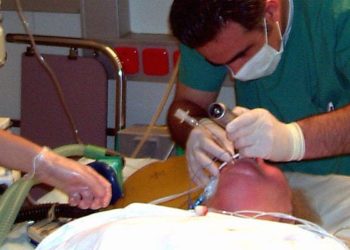Quick Take: The IRIS Trial: Effect of cricoid pressure compared with a sham procedure in the rapid sequence intubation of anesthesia
The administration of anesthetic agents during induction results in a loss of protective upper airway reflexes, and thus may be associated with an increased risk of pulmonary aspiration. While uncommon in elective procedures where fasting rules have been observed, the risk of pulmonary aspiration is significantly increased in emergency settings. In these settings, rapid sequence induction (RSI) is employed to minimize this risk, where a short-acting hypnotic, muscle relaxant, and manual pressure to the cricoid cartilage is applied. The efficacy of cricoid pressure during RSI, however, has been a subject of debate. In this randomized controlled trial, 3472 patients undergoing anesthesia with RSI with a full stomach (<6 hours fasting) or the presence of at least 1 risk factor for pulmonary aspiration were randomized to a cricoid pressure or sham procedure group to assess whether the incidence of pulmonary aspiration is increased when cricoid pressure is not performed. Researchers found that the rate of pulmonary aspiration did not significantly differ between the groups, where this event occurred in 10 patients in the cricoid pressure group (0.6%) compared to 9 patients in the sham group (0.5%) (RR 0.90, 95% CI 0.33 to 2.38). This study therefore indicates that the application of cricoid pressure during RSI may not reduce the risk of pulmonary aspiration in patients undergoing RSI. Additional studies are needed in other high-risk populations, including pregnant women and patients undergoing RSI outside of the operating room setting.
Click to read the study in JAMA
Image: PD
©2018 2 Minute Medicine, Inc. All rights reserved. No works may be reproduced without expressed written consent from 2 Minute Medicine, Inc. Inquire about licensing here. No article should be construed as medical advice and is not intended as such by the authors or by 2 Minute Medicine, Inc.







